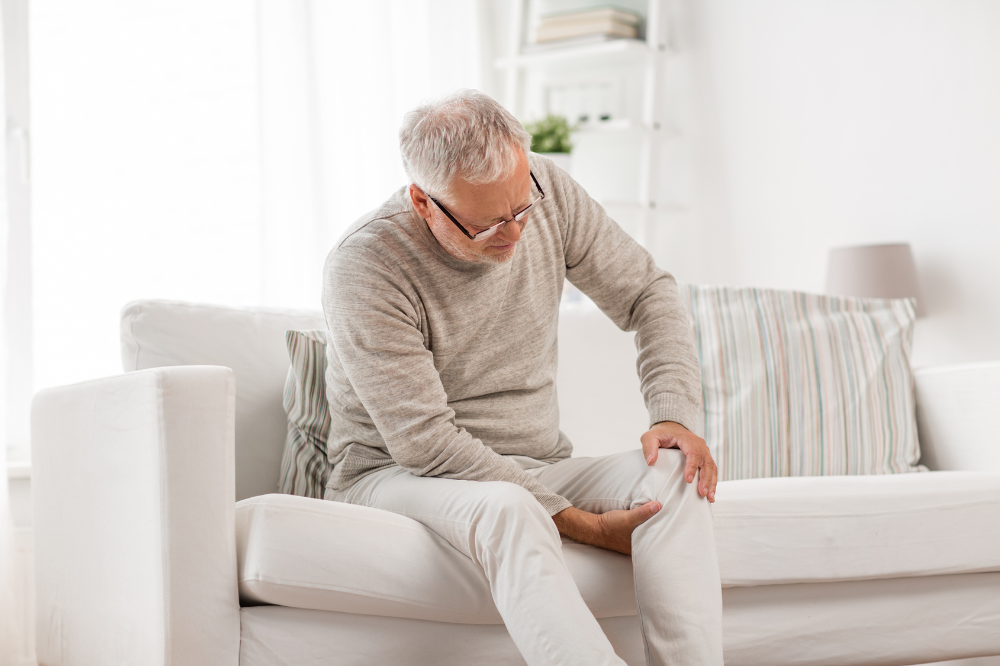If you’ve ever noticed your aches, pains, or joint stiffness seem to worsen in the evening, you’re not alone. Many people find that discomfort ramps up just as they’re settling down for the night, making it harder to relax and drift off to sleep. But why does this happen?
And more importantly, why do many people feel better when the weather warms up? In this guide, we’ll explain the connection between pain, sleep, and the seasons, and how warmer days could offer welcome relief.
Why Do Aches and Pains Feel Worse at Night?
Pain and sleep have a closely linked relationship. Pain can make it harder to sleep, and poor sleep can heighten your sensitivity to pain. But there are also a few specific reasons why discomfort can feel worse at night:
1) Less Movement
During the day, moving around helps keep your joints lubricated and your muscles flexible. Simple activities like walking, stretching, and using your hands help maintain blood flow and reduce stiffness. At night, when you’re lying still in bed, joints and muscles can become stiff, leading to increased soreness.
2) Natural Changes in Hormones
Your body’s hormone levels naturally fluctuate throughout the day and night. One of these is cortisol, a hormone that helps manage inflammation. Cortisol levels drop in the evening, meaning your body is less equipped to fight off inflammation at night. As a result, conditions like arthritis, back pain, and muscle tension can flare up after dark.
3) Increased Inflammatory Response
While you sleep, your immune system becomes more active, helping your body repair and recover. This process also triggers inflammation, which can cause pain and stiffness to feel worse as you settle down.
4) Distraction Is Reduced
When you’re busy during the day, you’re often too distracted to focus on minor aches and pains. In the quiet of the evening, those same discomforts can feel much more noticeable.
How Warm Weather Can Help Your Aches
On the brighter side, many people report that aches and pains ease up when the weather gets warmer. Here’s why:
1) Improved Circulation
Warm weather naturally boosts blood flow throughout your body. Good circulation is essential for transporting oxygen and nutrients to muscles and joints, helping to ease stiffness and reduce pain.
2) More Natural Movement
When it’s sunny and mild outside, people tend to be more active. Light exercise like walking, gardening, or stretching in warmer weather keeps joints mobile and muscles relaxed, helping to relieve discomfort.
3) Less Joint Stiffness
Cold temperatures can cause muscles and tendons to tighten, leading to stiffness and aches. Warmer weather allows soft tissues to stay looser and more flexible, reducing tension in the body.
4) Mood Boosting Benefits
Sunshine triggers the release of feel-good hormones like serotonin, which can improve your mood and help reduce the perception of pain. Warmer, brighter days also encourage better sleep, breaking the cycle of pain-related sleep issues.
Struggling with Outdoor Mobility?
If you find it difficult to manage your garden steps or access outdoor spaces safely, a stairlift isn’t just for inside the home. Leading mobility suppliers, like Halton Stairlifts, offer a range of high-quality stairlifts, including outdoor stairlifts, that are designed specifically for garden steps and outside steps.
They’re built to withstand the British weather and are a great choice if you’re looking to enjoy your garden and outdoor areas without the risk of slips, trips, or strain.
Reduce Your Aches This Summer
It’s completely natural for aches and pains to feel worse at night, thanks to a combination of reduced movement, hormonal changes, and your body’s internal repair processes. The good news is that warmer weather can ease discomfort by improving circulation, increasing flexibility, and lifting your mood.
If you struggle with outdoor mobility or want to stay active in your garden during the sunnier months, consider looking into outdoor stairlift options. A simple change could make a big difference to your comfort, confidence, and quality of life this summer.


















